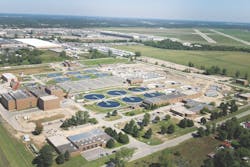About the author: Steven London is president of Steven London Associates. London can be reached at [email protected].
The Ypsilanti Community Utilities Authority (YCUA) was formed in 1974 when the Charter Township of Ypsilanti and the City of Ypsilanti combined their respective water departments. YCUA provides water and/or wastewater services to portions of eastern Washtenaw County and western Wayne County.
YCUA purchases water from the Detroit Water and Sewerage Department and distributes it to approximately 112,000 people. In addition to distributing water and providing wastewater collection and treatment to the founding member communities (the township and city), YCUA also supplies water to and collects and treats wastewater from Augusta Township, Pittsfield Township, Superior Township, and portions of York Township, Canton Township, and Van Buren Township. YCUA also provides wastewater treatment to Sumpter Township and the Western Townships Utilities Authority, which collects wastewater from the Townships of Canton, Plymouth, and Northville in Wayne County. The total population of the member and contract communities is greater than 291,000 people.
YCUA is responsible for operation and maintenance of the public wastewater facilities within the Charter Township of Ypsilanti and the City of Ypsilanti, as well as the pressure sewer pipe that transports the effluent from the wastewater treatment plant to the discharge location along the Rouge River in Wayne County. The YCUA wastewater system includes more than 200 miles of collection sewers, more than 60 miles of interceptor sewers, almost 23 miles of sanitary force mains, 32 pump stations, and the wastewater treatment plant. The wastewater treatment plant provides tertiary treatment and disinfection before discharge to the Lower Rouge River. The design treatment capacity of the wastewater treatment plant is 51.2 million gal per day.
Ypsilanti Community Utilities Authority workers replace mixers throughout its wastewater system by draining one tank at a time, removing the old mast with an old mixer, and replacing it with a tripod mast and new mixer. The process is expected to take several years to replace all 30 mixers.
Energy Savings
YCUA employs a total of 30 mixers in its aeration tanks as part of an anoxic-oxic nutrient removal process. The mixers were old, inefficient, and starting to fail, so YCUA elected to replace them with Flygt 4320 mixers with the help of local Xylem distributor, Kennedy Industries. Three mixers were installed and three more are on order as plant personnel take down one tank at a time, a process that is expected to take several years to complete. Each tank is drained, the old mast is removed with the old mixer, and then a new tripod mast with the new mixer is installed.
“Although our current replacement pace will take several years, we are hoping to find funding to replace all old mixers in a much shorter time frame,” said Scott Westover, YCUA engineering manager.
Before deciding on the mixers, Kennedy Industries along with YCUA operations and maintenance personnel performed an extensive energy study of the aeration mixers. The old mixers varied by manufacturer, horsepower, thrust, and input kilowatts to operate. The study evaluated the mixers in terms of performance and energy use. The mixers operate 24 hours a day, seven days a week, so energy usage is significant and it was believed it could be reduced.
Over a couple of weeks, Kennedy and YCUA personnel installed an Acuvim 2W power monitor on one of the new mixers at the plant, as well as the other manufacturer’s equipment for comparison purposes. The monitor stands had wheels so they could simply be rolled from mixer to mixer. The mixers were monitored at five-minute intervals and all electrical data was transmitted via cellular modem and sent to Kennedy’s servers so that YCUA could view the results in real time on a secure web site.
When looking at 10-year energy costs based on $0.08 per kWh, the new mixer would use $4,274, resulting in a savings of $29,196 to $44,221 per mixer replaced. And what’s more, it is currently operating at 22 rpm so further reducing the speed to 16 rpm would reduce the input kilowatts to 0.24, or $1,681.90 over 10 years. These results do not take into consideration any changes in electrical energy costs over this time span; however, the cost of electricity increases each year, so the savings are likely to be even greater than initially reported. These potential energy savings could approach $1 million over 10 years.
The mixers are built with IE4 equivalent permanent magnet motors and integrated intelligent speed control. These features enable the mixer to generate the needed thrust, while requiring as little as 50% of the power that compact submersible mixers consume. The new motor and drive combination also gives operators the ability to dial in any speed or thrust needed (up to 3,400 Newtons) with a button on the tank-side control panel.
Furthermore, the mixers require maintenance only once every two years. At Ypsilanti, they currently run at 22 rpm. This low speed provides long lasting service due to reduced vibration, which leads to longer bearing, mechanical seal, and gear drive life. Equipped with Modbus protocol, the mixers can transmit data on input kilowatts, amps, volts, and power factor, providing full control from YCUA’s SCADA screens.
Three propeller sizes are available, each in two- or three-blade versions: 55, 79 and 98 in. for a range of mixing applications. Power options can be selected from 2, 4 and 8 kW.
The tripod rail assembly is compatible with all existing mixers and allows pin pointing the exact angle for proper mixer positioning and efficiency. At the Ypsilanti project, the rail assembly was extended up to the railing for easy installation using a chain with a grip eye. The top rail was manufactured with a through-hole to allow for easy installation, and weep holes were drilled for water to drain if the tank was taken out of service and drained for cleaning.
With the help of Kennedy Industries, Ypsilanti Community Utilities Authority conducted energy studies to compare its mixers already in use to those recently installed. It found the new mixers could save the authority $1 million in energy costs over 10 years.


